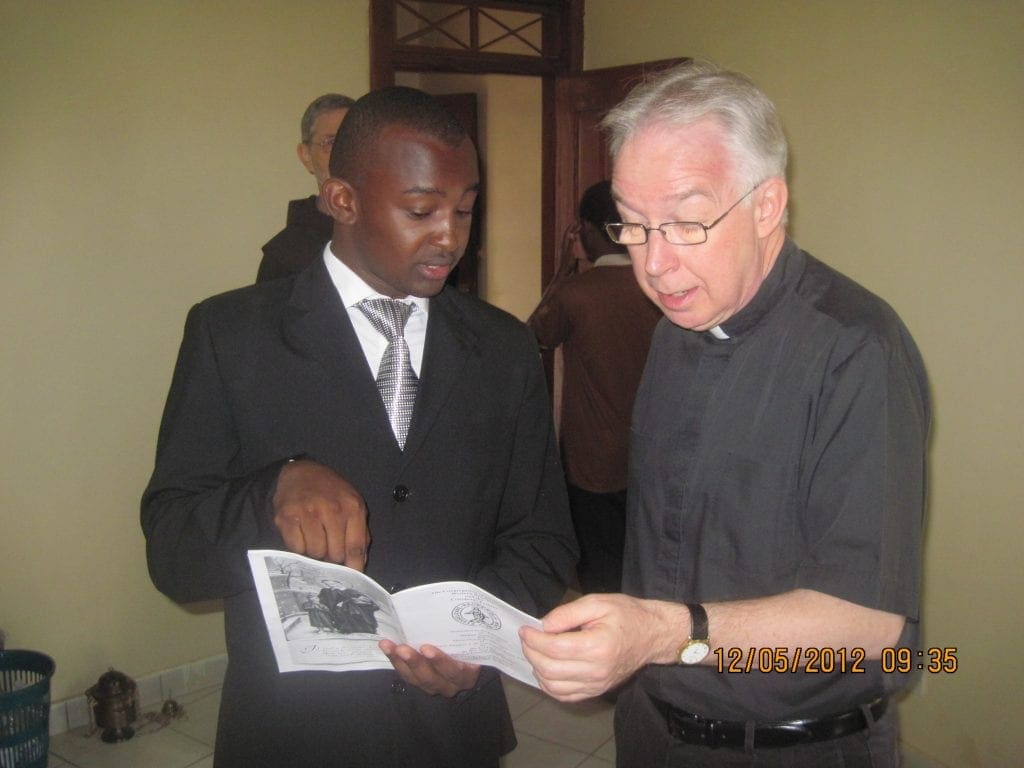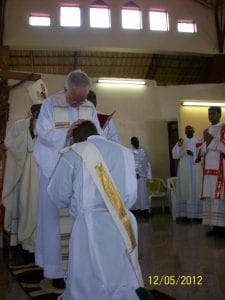I am a Vincentian priest who has served in Kenya for the last twelve years. During that time I have worked as a formator, training young Kenyans to be good Vincentian priests and brothers.
One of the gifts of Vincentian missionary work is learning to be at home in another culture. Going forth on mission means leaving one’s own cultural assumptions aside and humbly entering in to the meanings and values of the people who welcome us.

This challenge of inculturation has led me to rethink the ministry of Vincentian formation. What does it mean to be a Vincentian formator in East Africa? Thankfully, my Kenyan brothers have helped me understand the work of formation through their eyes. To be a formator is to be a father or a mother, someone willing to share everyday life while encouraging young Vincentians to take hold of our Vincentian tradition and translate it into effective service of the poor.
 In East African cultures, the family is very important. The family holds an honored place in African life. The Church of Africa refers to itself as the “Family of God.” Family includes mother and father and siblings as well as members of the extended family. It is not unusual at the end of a conversation for one friend to say to another: “Greet your parents and your family for me.” Africans look on the individual as an extension of his or her parents.
In East African cultures, the family is very important. The family holds an honored place in African life. The Church of Africa refers to itself as the “Family of God.” Family includes mother and father and siblings as well as members of the extended family. It is not unusual at the end of a conversation for one friend to say to another: “Greet your parents and your family for me.” Africans look on the individual as an extension of his or her parents.
What does it mean to be a Vincentian formator in Africa? It means assuming the role of a father or a mother in the life of a young person being formed. African Vincentians understand the formation process through the dynamics of family life. As the family is a place of solidarity and growth, so should the formation community be. As parents are a source of presence, wisdom, and correction, so should the formator be in the life of a young person in Vincentian formation.
Americans tend to think of formation as a time of training. We speak of ministry formation as an exchange between an expert and an apprentice. But in Kenya, the relationship between the formator and the one being formed is understood in a familial, family-centered way. In my experience it is not uncommon to hear a man in formation say to me: “You are my father. While I am here, you take the place of my father at home.” I have no doubt that a Vincentian woman formator will hear herself referred to as mother.
There is something striking about this. In the East African context, the role of the formator is personal and direct. It demands a commitment of time and energy and attention, like that of a father toward a son. It requires that formators cultivate trust and openness, commit themselves to life in community, and model the truths and values of the family – in this case, the Vincentian Family.
What does this suggest for Vincentian missionaries, especially those entrusted with the formation of young people? From the African and Vincentian perspective, formation for mission invites us to get involved with young persons, to walk with them. Formation for mission involves sharing the truths and values of the family, that rich tradition that we inherit from St. Vincent and St. Louise. Formation for mission requires the daily work of encouraging and challenging others. Formation for mission includes the gift of personal example: our own commitment to those values so dear to St. Vincent – humility, simplicity, a thirst for justice, an openness to community, a passion for the poor, and a deep love for God. Formation for mission invites us to walk with others with the heart of a mother or a father.
I have learned that being a Vincentian formator is learning to be a father to young people. The Kenyan context has taught me this. Vincentian missionaries who form youth in the spirit of St. Vincent are challenged to the great vocation of being mothers and fathers of our Vincentian charism.

Fr. Tom Esselman, C.M.
24 June 2020
tesselmancm@gmail.com







Thank you, Father/Mother Esselman, for this interesting and enlightening article on formation. The Lord continue to grant success to your Vincentian ministry.
Your article reminds me of St. Vincent’s letter to a C.M. student, which reads in part (SV.EN V:537):
“I thank you most affectionately, dear Brother, for your heartfelt, effective love for your poor mother; you are like a well-born child, who never ceases to love tenderly the one who gave him birth, however poor and unattractive she may be. May God be pleased to grant the Company to which you belong the grace of raising you, by its example and practices, to a great love of Our Lord Jesus Christ, who is our father, our mother, and our all.”
Thank you Fr Tom. I often wondered why I was referred to as Mamma by everyone – even similar aged Kenyans. Your sensitive article was most helpful. Thank you too Ross for offering a Vincentian parallel.
Thanks, Tom, for this heartfelt take on Vincentian formation. I’ve seen you in action there in Kenya and you fit these ideals you write about.
Thanks, Tom, for your focus on family relationships in formation in Kenya. My only addition would be that I think, especially now, we ought to be seeing all formation in the context of family relationships, including biological families. also in the USA ;unfortunately, in my formation days many years ago, we were not even allowed to go home for special family events. I think we need to promote both Congregational family and biological family values. It ought not be one or the other, even in the USA. Peace!
Fr Tom you are a great treasure to the Vincentians in Kenya. The DCs greatly appreciate your love and for accompanying us spiritually. Thanks a million for your exemplary service here in Kenya. Blessings!
Thanks Fr. Tom. I benefitted greatly from your fatherly care throughout my seminary life here in Kenya. Thanks for capturing the memories…really nostalgic…I can see the photo while in my black suit. It’s indeed a family set up where values and in-depth traditions are cultivated. Formation of this kind has enabled me to appreciate the mission in a deeper way and help out as a Vincentian Priest. Formation in Africa continues for we grow as a family helping one another to achieve our collective goal, which is the mission of the congregation.
Great article Tom. Thank you very much for writing it